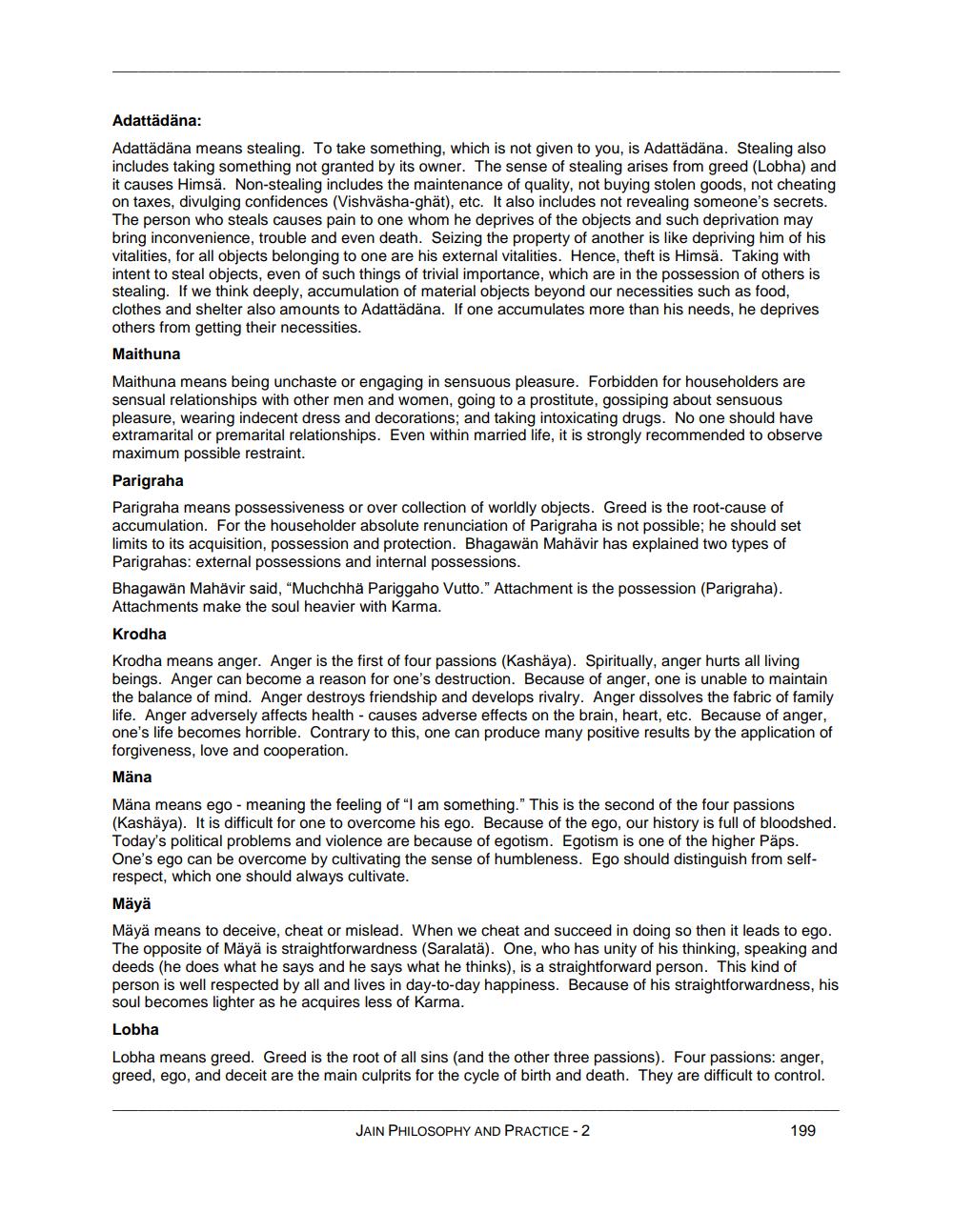________________
Adattädäna:
Adattädäna means stealing. To take something, which is not given to you, is Adattädäna. Stealing also includes taking something not granted by its owner. The sense of stealing arises from greed (Lobha) and it causes Himsä. Non-stealing includes the maintenance of quality, not buying stolen goods, not cheating on taxes, divulging confidences (Vishväsha-ghät), etc. It also includes not revealing someone's secrets. The person who steals causes pain to one whom he deprives of the objects and such deprivation may bring inconvenience, trouble and even death. Seizing the property of another is like depriving him of his vitalities, for all objects belonging to one are his external vitalities. Hence, theft is Himsä. Taking with intent to steal objects, even of such things of trivial importance, which are in the possession of others is stealing. If we think deeply, accumulation of material objects beyond our necessities such as food, clothes and shelter also amounts to Adattädäna. If one accumulates more than his needs, he deprives others from getting their necessities. Maithuna
Maithuna means being unchaste or engaging in sensuous pleasure. Forbidden for householders are sensual relationships with other men and women, going to a prostitute, gossiping about sensuous pleasure, wearing indecent dress and decorations; and taking intoxicating drugs. No one should have extramarital or premarital relationships. Even within married life, it is strongly recommended to observe maximum possible restraint. Parigraha Parigraha means possessiveness or over collection of worldly objects. Greed is the root-cause of accumulation. For the householder absolute renunciation of Parigraha is not possible; he should set limits to its acquisition, possession and protection. Bhagawan Mahävir has explained two types of Parigrahas: external possessions and internal possessions. Bhagawan Mahävir said, "Muchchhä Pariggaho Vutto." Attachment is the possession (Parigraha). Attachments make the soul heavier with Karma. Krodha Krodha means anger. Anger is the first of four passions (Kashäya). Spiritually, anger hurts all living beings. Anger can become a reason for one's destruction. Because of anger, one is unable to maintain the balance of mind. Anger destroys friendship and develops rivalry. Anger dissolves the fabric of family life. Anger adversely affects health - causes adverse effects on the brain, heart, etc. Because of anger, one's life becomes horrible. Contrary to this, one can produce many positive results by the application of forgiveness, love and cooperation. Mäna
Mäna means ego - meaning the feeling of "I am something." This is the second of the four passions (Kashaya). It is difficult for one to overcome his ego. Because of the ego, our history is full of bloodshed. Today's political problems and violence are because of egotism. Egotism is one of the higher Päps. One's ego can be overcome by cultivating the sense of humbleness. Ego should distinguish from selfrespect, which one should always cultivate. Mäyä Mäyä means to deceive, cheat or mislead. When we cheat and succeed in doing so then it leads to ego. The opposite of Mäyä is straightforwardness (Saralatä). One, who has unity of his thinking, speaking and deeds (he does what he says and he says what he thinks), is a straightforward person. This kind of person is well respected by all and lives in day-to-day happiness. Because of his straightforwardness, his soul becomes lighter as he acquires less of Karma. Lobha Lobha means greed. Greed is the root of all sins (and the other three passions). Four passions: anger, greed, ego, and deceit are the main culprits for the cycle of birth and death. They are difficult to control.
JAIN PHILOSOPHY AND PRACTICE - 2
199




